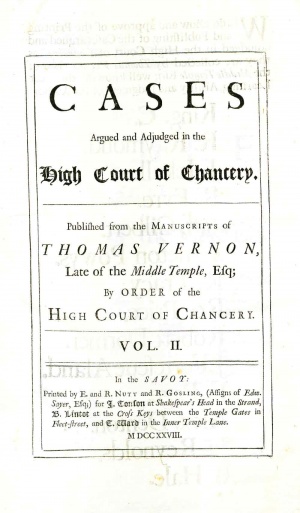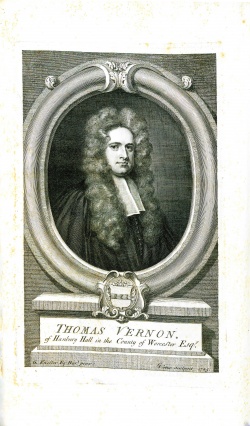Difference between revisions of "Cases Argued and Adjudged in the High Court of Chancery"
(Frontispiece, Evidence, and edits) |
|||
| Line 6: | Line 6: | ||
|link=https://catalog.swem.wm.edu/law/Record/55235 | |link=https://catalog.swem.wm.edu/law/Record/55235 | ||
|shorttitle=Cases Argued and Adjudged in the High Court of Chancery | |shorttitle=Cases Argued and Adjudged in the High Court of Chancery | ||
| + | |commontitle=Vernon's Reports | ||
|vol=volume two | |vol=volume two | ||
|author=Thomas Vernon | |author=Thomas Vernon | ||
| + | |editor=William Melmoth and William Peere Williams | ||
|publoc=London, In the Savoy | |publoc=London, In the Savoy | ||
|publisher=Printed by E. and R. Nutt and R. Gosling (assigns of Edw. Sayer) for J. Tonson | |publisher=Printed by E. and R. Nutt and R. Gosling (assigns of Edw. Sayer) for J. Tonson | ||
| − | |year=1726- | + | |year=1726-1728 |
|lang=English | |lang=English | ||
|set=2 | |set=2 | ||
| − | |desc=33 cm. | + | |desc=Folio (33 cm.) |
| − | }}Thomas Vernon (1654-1721) | + | }}[[File:VernonCase1726V1Frontispiece.jpg|left|thumb|250px|<center>Frontispiece, volume one.</center>]]Thomas Vernon (1654-1721), a preeminent practitioner in chancery cases and a politician in the House of Commons, was admitted to the Middle Temple in 1672 and called to the bar in 1679.<ref> Stuart Handley, [http://www.oxforddnb.com/view/article/28248 “Vernon, Thomas (1654–1721)”], “Oxford Dictionary of National Biography”, (Oxford University Press, 2004- ), accessed Nov 22, 2013. Subsequent biographical information derives from this source unless otherwise noted.</ref> Vernon amassed great wealth from his labors, enabling him to develop a large country estate near Hanbury in Worchestershire. He also engaged in politics, becoming a knight of the shire in 1715. He also remained active as a practitioner, working in the chancery court until his death in 1621.<br /> |
| + | <br /> | ||
| + | Vernon's ''Reports'' were published posthumously, the manuscript of which was the subject of some controversy. After his death, Vernon's wife, trustees, and heirs all claimed his papers. Ultimately, the court decided to keep and publish the papers without collecting profit from the work.<ref>Ibid.</ref> Scholars consider the first edition of the reports, edited by William Melmoth and William Peere Williams, full of errors making it nearly useless.<ref>J. G. Marvin, ''Legal Bibliography or a Thesaurus of American, English, Irish, and Scotch Law Books'' (Philadelphia: T. & J. W. Johnson, Law Booksellers, 1847) 709.</ref> Later editions correct the mistakes in the first and are considered the “best of the old Chancery reporters,” however, “unless they are read with scrupulous attention, they may prove to be dangerous guides.”<ref>Ibid.</ref> | ||
==Evidence for Inclusion in Wythe's Library== | ==Evidence for Inclusion in Wythe's Library== | ||
| + | There is no doubt that Wythe owned the first edition of this title—a copy at the Library of Congress includes George Wythe's bookplate in each volume. We also know that Wythe ordered these reports from London merchant John Norton in a letter dated May 7, 1770. The letter's endorsement indicates it was answered on July 28, 1770.<ref>Mason, John Norton & Sons Newton; Abbot, 1968, p. 134, "Andrews' reports".</ref> Finally, [[Thomas Jefferson]] listed ''Vernon's reports. 2.v. fol.'' in his [[Jefferson Inventory|inventory]] of [[Wythe's Library]], noting that he kept the volume himself. He later sold it to the Library of Congress. Not surprisingly, all four of the [[George Wythe Collection|Wythe Collection]] sources (Goodwin's pamphlet<ref>Mary R. M. Goodwin, [http://research.history.org/DigitalLibrary/View/index.cfm?doc=ResearchReports\RR0216.xml ''The George Wythe House: Its Furniture and Furnishings''] (Williamsburg, Virginia: Colonial Williamsburg Foundation Library, 1958), L.</ref>, [[Dean Bibliography|Dean's Memo]]<ref>[[Dean Bibliography|Memorandum from Barbara C. Dean]], Colonial Williamsburg Found., to Mrs. Stiverson, Colonial Williamsburg Found. (June 16, 1975), 7 (on file at Wolf Law Library, College of William & Mary).</ref>, Brown's Bibliography<ref>Bennie Brown, "The Library of George Wythe of Williamsburg and Richmond," (unpublished manuscript, May, 2012) Microsoft Word file. Earlier edition available at: https://digitalarchive.wm.edu/handle/10288/13433</ref> and [http://www.librarything.com/profile/GeorgeWythe George Wythe's Library]<ref>''LibraryThing'', s. v. [http://www.librarything.com/profile/GeorgeWythe "Member: George Wythe"], accessed on June 28, 2013.</ref> on LibraryThing list ''Vernon's Reports''. The Wolf Law Library moved a copy of the first edition from another rare book collection to the [[George Wythe Collection]]. | ||
==Description of the Wolf Law Library's copy== | ==Description of the Wolf Law Library's copy== | ||
| + | Rebound in black leather with red leather labels and black marbelled endpapers. Purchased through the generosity of Daniel W. Baran and Lena Stratton Baran, Class of 1936. | ||
| + | |||
View this book in [https://catalog.swem.wm.edu/law/Record/55235 William & Mary's online catalog.] | View this book in [https://catalog.swem.wm.edu/law/Record/55235 William & Mary's online catalog.] | ||
| − | + | ==References== | |
<references/> | <references/> | ||
| Line 26: | Line 33: | ||
[[Category:Chancery Reports]] | [[Category:Chancery Reports]] | ||
[[Category:George Wythe Collection at William & Mary's Wolf Law Library]] | [[Category:George Wythe Collection at William & Mary's Wolf Law Library]] | ||
| + | [[Category:Known Surviving Wythe Volumes]] | ||
[[Category:Titles in Wythe's Library]] | [[Category:Titles in Wythe's Library]] | ||
Revision as of 10:35, 6 February 2014
by Thomas Vernon
| Vernon's Reports | |
|
Title page from Cases Argued and Adjudged in the High Court of Chancery, volume two, George Wythe Collection, Wolf Law Library, College of William & Mary. | |
| Author | Thomas Vernon |
| Editor | William Melmoth and William Peere Williams |
| Published | London, In the Savoy: Printed by E. and R. Nutt and R. Gosling (assigns of Edw. Sayer) for J. Tonson |
| Date | 1726-1728 |
| Language | English |
| Volumes | 2 volume set |
| Desc. | Folio (33 cm.) |
Vernon's Reports were published posthumously, the manuscript of which was the subject of some controversy. After his death, Vernon's wife, trustees, and heirs all claimed his papers. Ultimately, the court decided to keep and publish the papers without collecting profit from the work.[2] Scholars consider the first edition of the reports, edited by William Melmoth and William Peere Williams, full of errors making it nearly useless.[3] Later editions correct the mistakes in the first and are considered the “best of the old Chancery reporters,” however, “unless they are read with scrupulous attention, they may prove to be dangerous guides.”[4]
Evidence for Inclusion in Wythe's Library
There is no doubt that Wythe owned the first edition of this title—a copy at the Library of Congress includes George Wythe's bookplate in each volume. We also know that Wythe ordered these reports from London merchant John Norton in a letter dated May 7, 1770. The letter's endorsement indicates it was answered on July 28, 1770.[5] Finally, Thomas Jefferson listed Vernon's reports. 2.v. fol. in his inventory of Wythe's Library, noting that he kept the volume himself. He later sold it to the Library of Congress. Not surprisingly, all four of the Wythe Collection sources (Goodwin's pamphlet[6], Dean's Memo[7], Brown's Bibliography[8] and George Wythe's Library[9] on LibraryThing list Vernon's Reports. The Wolf Law Library moved a copy of the first edition from another rare book collection to the George Wythe Collection.
Description of the Wolf Law Library's copy
Rebound in black leather with red leather labels and black marbelled endpapers. Purchased through the generosity of Daniel W. Baran and Lena Stratton Baran, Class of 1936.
View this book in William & Mary's online catalog.
References
- ↑ Stuart Handley, “Vernon, Thomas (1654–1721)”, “Oxford Dictionary of National Biography”, (Oxford University Press, 2004- ), accessed Nov 22, 2013. Subsequent biographical information derives from this source unless otherwise noted.
- ↑ Ibid.
- ↑ J. G. Marvin, Legal Bibliography or a Thesaurus of American, English, Irish, and Scotch Law Books (Philadelphia: T. & J. W. Johnson, Law Booksellers, 1847) 709.
- ↑ Ibid.
- ↑ Mason, John Norton & Sons Newton; Abbot, 1968, p. 134, "Andrews' reports".
- ↑ Mary R. M. Goodwin, The George Wythe House: Its Furniture and Furnishings (Williamsburg, Virginia: Colonial Williamsburg Foundation Library, 1958), L.
- ↑ Memorandum from Barbara C. Dean, Colonial Williamsburg Found., to Mrs. Stiverson, Colonial Williamsburg Found. (June 16, 1975), 7 (on file at Wolf Law Library, College of William & Mary).
- ↑ Bennie Brown, "The Library of George Wythe of Williamsburg and Richmond," (unpublished manuscript, May, 2012) Microsoft Word file. Earlier edition available at: https://digitalarchive.wm.edu/handle/10288/13433
- ↑ LibraryThing, s. v. "Member: George Wythe", accessed on June 28, 2013.

